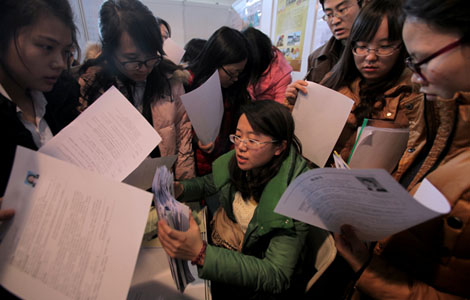Governance reform the key
Updated: 2013-12-16 07:23
By Yu Keping (China Daily USA)
|
||||||||
Social inequality and lack of trust in the authorities show modernization of political system and mechanisms needed
Of the many innovative decisions made at the Third Plenary Session of the 18th Central Committee of the Communist Party of China as a blueprint for the ongoing reform drive, the modernization of governance is the most significant.
By highlighting the governance system and governing capability in the roadmap document released after the plenum, the Party has made clear the direction of reform is modernizing its political system, which in turn requires substantial innovations in politics, decision-making procedure, the judicial process, the budget and supervision. It is the experience of reform over the past 35 years that has highlighted the importance of improving the State governance system and the Party's governance capabilities. For the past 35 years, China owes its constant economic development and social stability largely to continuous reform, which has been governance modernization in essence. Now the plenum has offered the needed theoretical support for further governance modernization with the roadmap document.
Governance modernization is also a response to the serious challenges that China is encountering in its development: vested interest groups, increasingly fierce conflicts of interests, worsening environmental degradation, social injustice and the lack of public trust in the authorities. These challenges mean China's current governing system and capabilities are insufficient to meet the changing needs of society. Without innovative reforms, these challenges might possibly develop into a political crisis that poses a threat to the Party's rule. As the document sets out, the ultimate solution to the crisis lies in reform that modernizes the State governance system.
The success of such reform lies in further emancipation of the mind. This is because governance reform, as a facet of the wide-ranging reforms in the political regime, is politically sensitive and policymakers may become overcautious in the reform process. As the central leadership emphasized at the latest plenum, the emancipation of the mind should know no boundary. Any new ideas and approaches aimed at promoting social fairness and justice and improving people's well-being deserve special attention and arduous efforts should be made to encourage them. Any governance mechanism that fails to meet people's expectations and hinders the country's social and political advancement should be removed.
Yet, even with further emancipation of the mind, governance reform will be no easy task, as the longstanding problems of fragmented management, shortsighted policy initiatives, localism and poor coordination among different government sectors in policymaking have severely undermined governance at the national level. That is why China's governance modernization calls for a top-level design that is well coordinated, so it can go beyond the pursuit of immediate and vested interests and promote broad discussions in the decision-making process to avoid any piecemeal approach to problems.
Despite the aforementioned problems, it should be noted that governments at all levels have made relentless efforts over the past 35 years of reform and opening-up to explore and innovate ways of governance and have accumulated some experience. These mature governance reform initiatives should be taken as a reference and even incorporated into the State governance system.
Meanwhile, not only should local experience be given credit, China should continue to draw on the experiences of other countries, which is what it has been doing over the past decades with the introduction and implementation of public hearings for policymaking, one-stop public services, and government accountability, among other things.
China has undeniably made great strides in promoting democracy and the rule of law in recent decades, but the worship of power above everything still prevails in Chinese officialdom. Success in governance reform will be impossible without steadfast efforts being made to uproot power worship and place power in a cage of rules, as emphasized by the central leadership.
The country aims to achieve decisive outcomes in its reform push by 2020, but a comprehensive, scientific and effective governance mechanism will not come easy. Not only does it require steadfast determination and strong leadership, it also calls for broad-mindedness and superior political wisdom.
Its success lies in the wisdom of both the leadership and the people, the participation of both political elites and the general public. It presents a true test for the Party's capability of political motivation and entails strict adherence to the basic guideline of democratic, law-based and scientific governance.
The author is a professor and deputy director of the Central Compilation and Translation Bureau. This is an excerpt of his speech at a recent conference on reform staged by the bureau.
(China Daily USA 12/16/2013 page11)

 Moon rover, lander photograph each other
Moon rover, lander photograph each other
 With a hole in its heart, South Africa buries Mandela
With a hole in its heart, South Africa buries Mandela
 After the storm
After the storm
 Guangzhou beats Al-Ahly 2-0 at Club World Cup
Guangzhou beats Al-Ahly 2-0 at Club World Cup
 Two students wounded in US school shooting
Two students wounded in US school shooting
 21 died in Xinjiang coal mine explosion
21 died in Xinjiang coal mine explosion
 Mandela's body transferred to Qunu village
Mandela's body transferred to Qunu village
 Postgraduates get hard lessons at job fair
Postgraduates get hard lessons at job fair
Most Viewed
Editor's Picks

|

|

|

|

|

|
Today's Top News
 Chinese law firm expands in US
Chinese law firm expands in US
Complacency hinders US energy-saving strategies
China plans its Chang'e-5 lunar probe
Dialogue urged after naval incident
Chang'e-3 mission 'complete success'
Cave art's wide influence explored
DPRK leader's aunt unscathed after purge
Funding, market key to urbanization
US Weekly

|

|






